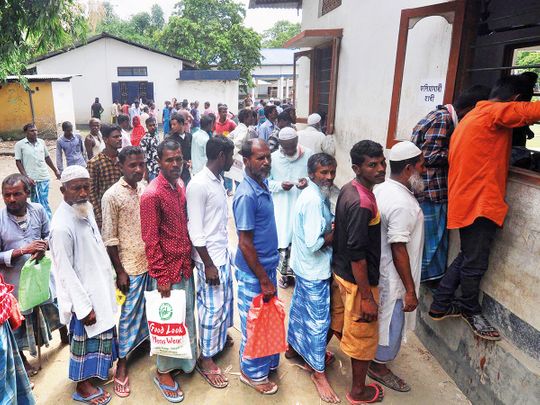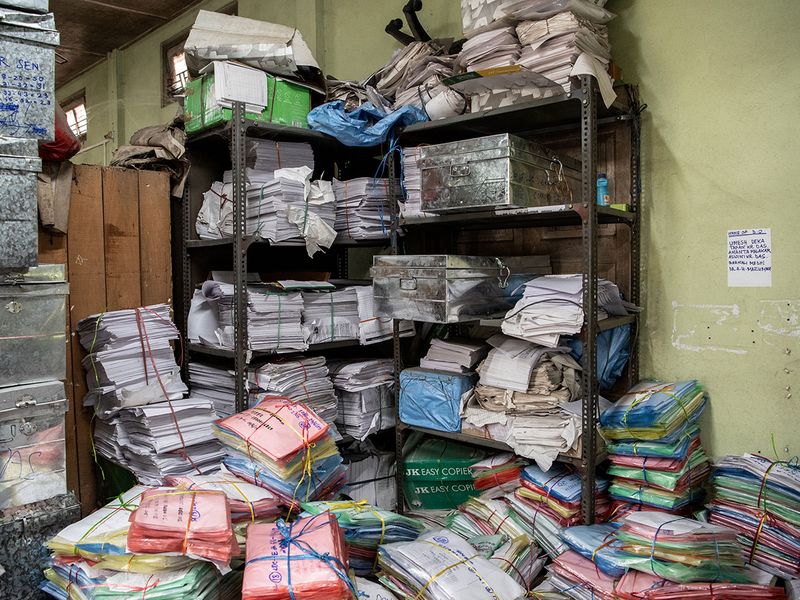
Guwahati: Almost two million people in northeast India were left facing statelessness on Saturday after the state of Assam published a citizenship list aimed at weeding out "foreign infiltrators", in a process the central government wants to replicate nationwide.
A total of 31.1 million people were included in a final National Register of Citizens (NRC), but 1.9 million were deemed ineligible, according to a statement from the Assam government. Most of those excluded were expected to be Muslim.
Assam, an impoverished isolated state of 33 million, has long seen large influxes from elsewhere, including under British colonial rule and around Bangladesh's 1971 war of independence when millions fled into India. For decades this has made Assam a hotbed of inter-religious and ethnic tensions. Sporadic violence has included the 1983 massacre of around 2,000 people.
This has led to pressure from those who see themselves as genuine Assamese for a lasting solution - which they hope will come from the NRC released on Saturday.
Only those who can demonstrate that they or their forebears were in India before 1971 could be included in the list.

But navigating the complex process is a huge challenge for many in a region of high illiteracy where many lack documentation.
In the morning, a steady trickle of people lined up to check their names on the final citizenship list in Buraburi village outside one of the many offices that have been set up across Assam for residents to verify the status of their citizenship applications.
Mijanur Rahman, a 47-year-old farmer, found himself, his 21-year-old son, and two of his daughters aged 16 and 14 included in the list. However, his wife and his other three daughters - all under the age of 10 - were excluded.
"I am really worried. We will see what the government does now. Maybe they will offer some help," a teary eyed Rahman told The Associated Press.
Earlier, Prateek Hajela, the State Coordinator of the National Register of Citizens (NRC), was quoted by Indian news agency ANI as saying that a total of 31,121,004 persons have been found eligible for inclusion in final list; 1,906,657 people have either been denied or did not apply.
Those not satisfied with the outcome, said Hajela, can approach the Foreigners Tribunals that are being set up.
The Assam government had said it would establish 400 Foreigners' Tribunals in the state to deal with the cases of people who are excluded from NRC.
Additional Chief Secretary (Home Political) Kumar Sanjay Krishna said the process is already on to set up 200 such tribunals and 200 more will be set up soon for the benefit of the excluded people.
The Foreigners' Tribunals are Quasi judicial courts mandated to hear appeals of those excluded from the NRC.
"The tribunals will be established in convenient locations to ensure that filing and hearing of appeals is smooth and efficient," said Krishna.
"People left out of the final NRC are not be detained under any circumstances till Foreigners Tribunals declare their decisions. These people can first approach the Foreigners' Tribunals (FT) and subsequently move higher courts if not satisfied with the FT ruling," he said adding that the state government will also make necessary arrangements to provide legal aid to those exclude from NRC by providing all assistance through the District Legal Services Authorities (DLSA).
He said the process of updation of NRC is being carried out by the Registrar General of India and the entire process is under the direct monitoring of the Supreme Court.
"Under the provisions of Foreigners Act, 1946 and Foreigners Tribunal Order, 1964, only Foreigner Tribunals are empowered to declare a person as a foreigner. Thus, non-inclusion of a person's name in the NRC does not by itself amount to him/her being declared a foreigner," Krishna clarified.
"The Government of India has also extended the time-limit for filing of appeals from 60 days to 120 days, and necessary amendment in this regard has been made in the Foreigners (Tribunals) Amendment Order, 2019," he added.
What would happen to rejected applicants?
Those who have been rejected by the tribunals and have exhausted all other legal avenues can be declared foreigners and - in theory - be placed in one of six detention centres with a view to possible deportation, although Bangladesh is yet to signal its cooperation.
Ten new such camps have been announced. One with space for 3,000 is being constructed in Goalpara, west of Assam's capital, Guwuhati.
The camps currently hold 1,135 people, according to the state government, and have been operating for years.
Nur Mohammad, 65, spent almost 10 years in one such camp until a Supreme Court order saw him released this month.
"I just want to ask them what is my crime? I was born here and lived in Assam all my life," he told AFP. "I don't know if my name will be in the NRC or not."
Media reports say that there have been more than 40 cases of suicide caused by concern over the NRC.
Samujjal Bhattacharya from the All Assam Students' Union (AASU), a key driver behind the NRC, said the register was necessary to protect Assam's indigenous "sons of the soil".
"We are not ready to live here like a second-class citizens in our own motherland," he said.








